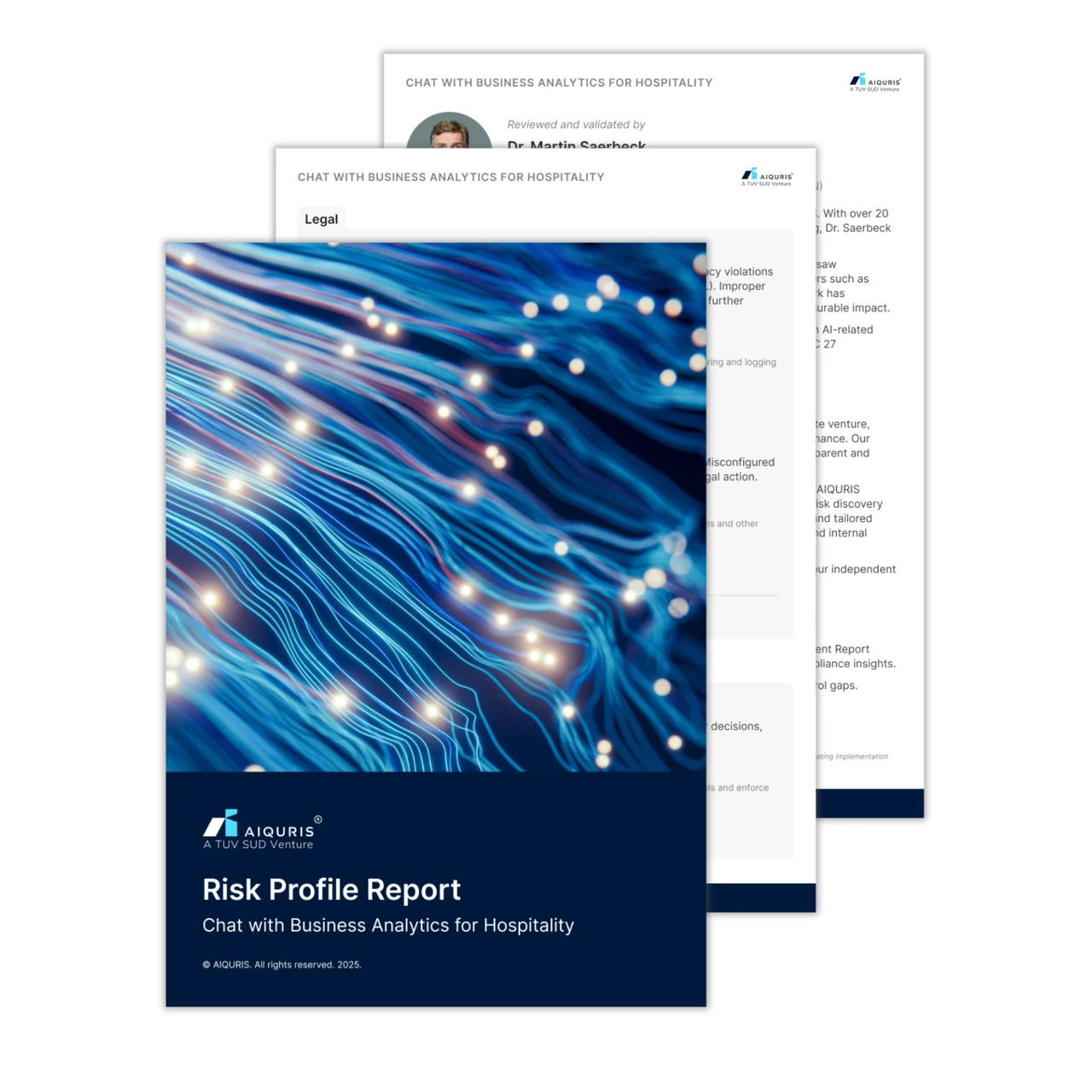In today's evolving digital landscape, the adoption of Artificial Intelligence (AI) has become essential for organisational success. IBM reveals that 35% of companies are leveraging AI technologies, marking a shift in operational efficiency and decision-making1. To remain competitive, organisations must adopt AI strategically while navigating risks.
The Strategic Role of AI in Gaining Competitive Advantage
Leading firms like Siemens, Mastercard, and John Deere illustrate how AI can transform operations into agile systems. Siemens employs AI-infused generative design within its engineering software to develop optimised product designs while reducing costs. These examples underscore the need of AI to drive value across various industries.2
While these companies exemplify AI’s potential, businesses must navigate complex risks—bias, security, and regulatory compliance—to fully realise AI’s benefits. AIQURIS ® provides organisations with structured governance frameworks to mitigate these risks and ensure AI adoption is both efficient and responsible.
Accelerating AI Adoption Across Industries
As challenges such as labour shortages and rising costs persist, there is an urgent need for solutions enhancing productivity without compromising quality. Nearly 66% of IT professionals report using automation tools powered by AI to reduce repetitive tasks, allowing human resources to focus on higher-value responsibilities.1 Here are real-world examples across different industries:
-
Finance: AI algorithms assist with risk assessment; for example, JPMorgan Chase developed an AI system called Contract Intelligence (COIN) to analyse legal documents and extract key data, significantly speeding up commercial loan agreement processes.3
-
Healthcare: AI enhances diagnostic accuracy; Google's DeepMind developed an AI system that can identify over 50 eye diseases as accurately as expert doctors.4
-
Technology: Companies like Salesforce leverage AI for smarter customer interactions, employing chatbots to provide instant support and resolve queries efficiently.5
-
Marketing: Coca-Cola uses AI for targeted campaigns, analysing consumer preferences to personalise advertising and optimise engagement. This approach enables them to tailor messaging to individual customers, increasing the effectiveness of their marketing spend and strengthening brand loyalty.6
Future Trends in AI Adoption
The trajectory of AI will increasingly rely on creative applications of technology, shaping the future of AI in organisations:
-
Predictive Analytics: Companies leverage AI for forecasting market demands, exemplified by Netflix’s recommendation system which uses predictive analytics to tailor content suggestions based on viewer behaviour. This approach necessitates careful attention to potential biases in algorithmic recommendations.7
-
Personalised Customer Experiences: Brands like Amazon employ machine learning algorithms to create unique shopping experiences tailored to individual preferences, raising concerns about data privacy that require robust governance measures.7
-
Enhanced Supply Chain Management: Walmart utilises AI-driven insights to optimise logistics and inventory management, demonstrating how AI can streamline operations but also necessitating rigorous oversight to maintain ethical practices.7
For CDOs, CIOs, and AI Governance Officers, deploying AI responsibly requires aligning innovation with GDPR compliance. Challenges like algorithmic opacity, data privacy concerns, and evolving regulations demand a clear strategy.
To scale AI effectively, leaders must prioritise risk mitigation, transparency, and governance frameworks. AIQURIS ® supports this by automating compliance tracking, risk profiling, and governance documentation, enabling proactive oversight and regulatory alignment.
Implementing Robust AI Governance Frameworks
A successful AI strategy requires comprehensive governance frameworks addressing risks related to bias and accountability. Organisations should implement specific risk management strategies, such as regular audits of AI systems and employee training focused on ethical AI practices. By proactively managing these potential pitfalls, organisations safeguard their reputations and foster stakeholder confidence in their AI initiatives.
To successfully deploy AI systems while mitigating risks and ensuring quality, companies should consider the following key steps:
-
Identify Use Cases and Define Context:
Organisations must clearly articulate the specific AI applications relevant to their operations. This involves understanding the business context, recognising industry-specific challenges, and determining the potential impacts on stakeholders.
-
Conduct Thorough Risk Assessments:
Implement a systematic risk management process to identify, evaluate, and mitigate potential threats. This includes addressing data quality issues, cybersecurity vulnerabilities, and biases inherent in AI algorithms. A structured risk assessment process helps ensure that AI systems are both safe and reliable.
-
Establish Quality Assurance Protocols:
Rigorous quality control is essential throughout the AI system lifecycle. Regular audits, performance evaluations, and continuous monitoring programmes are vital to maintain system reliability and drive improvements as technology evolves.
-
Adhere to International Standards:
Compliance with frameworks such as ISO/IEC 42001 is critical. This standard offers a robust, internationally recognised methodology for managing AI-related risks and ensuring quality. It covers areas such as policy development, resource allocation, and stakeholder engagement, thereby providing a holistic approach to AI governance.
-
Foster Cross-Functional Collaboration:
The successful deployment of AI requires close collaboration between various departments including cybersecurity, legal, and human resources. By working together, these teams ensure that AI initiatives comply with regulatory requirements and ethical guidelines while aligning with overall business objectives.
Maximising competitive advantage through AI adoption hinges on a strategic approach that combines innovation with responsible risk management. At AIQURIS ®, we understand the complexities involved in scaling AI initiatives confidently. Our platform empowers organisations to deploy AI use cases transparently, offering unparalleled visibility and control over associated risks. With our structured approach to AI governance, clients not only navigate ethical and regulatory challenges but also unlock transformative opportunities for growth. By embracing our tailored framework, organisations are better positioned to harness AI’s potential, driving a sustained competitive edge in today’s dynamic digital landscape.
Conclusion
As AI evolves, its integration into organisational practices will shape the future competitiveness of industries. Recognising AI as a vital driver of innovation allows businesses to position themselves ahead. Embracing AI responsibly—with a focus on governance—is essential for long-term success. Explore how AIQURIS ® can help you confidently scale your AI initiatives while navigating compliance and risk management.






